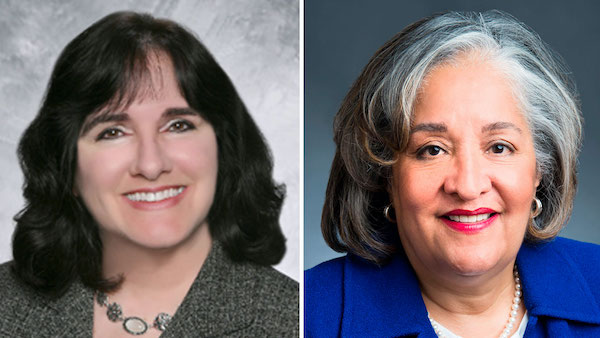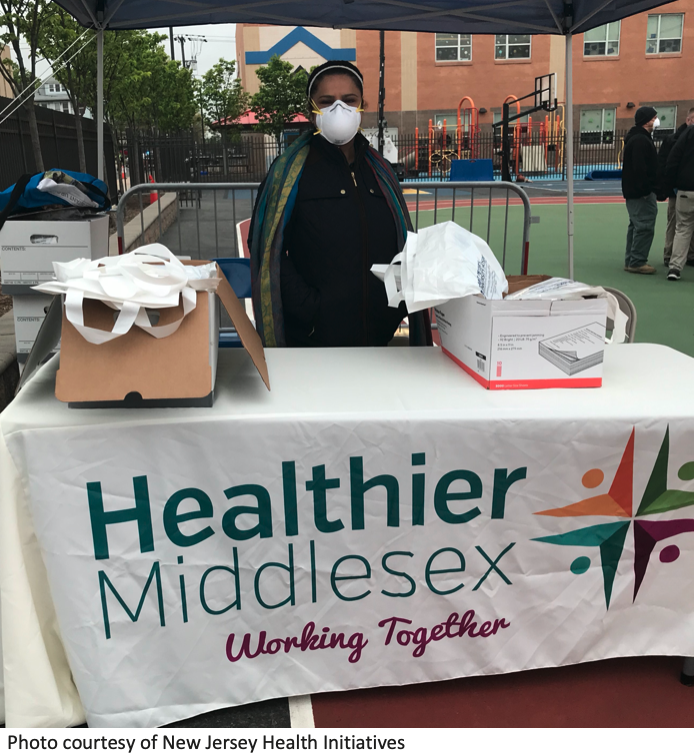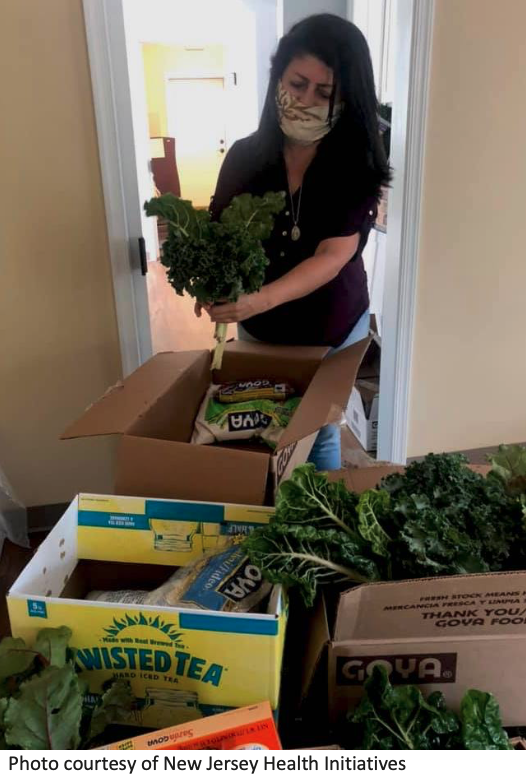Site Search
- resource provided by the Forum Network Knowledgebase.
Search Tip: Search with " " to find exact matches.
Joint Statement from CNJG and the Center for Non-Profits
This statement also appeared on NJ Spotlight.
A conversation between two customers in line at a New Jersey supermarket turned ugly when one man denigrated the other with a racial slur and blamed the fellow shopper for the coronavirus pandemic.
With so much else going on these days, it would be so easy to react to such a seemingly minor incident by saying, oh well, these things happen. Times are tough; tempers are short.
But shrugging our shoulders is not an option. Doing so is complicity in a wrongful acts that too often are repeated, over and over. Our silence merely emboldens those who would tear apart the fabric of our society, whether through hate or ignorance – or the extremely volatile mix of the two.
It’s not difficult to connect the dots between “little” incidents and the systemic racism that leads to tragedies like the killing of George Floyd in Minneapolis. When we ignore or accept any examples of people being demeaned over what they look like or where they (or their ancestors) came from, we only open the door for massive abuses and the wrenching reckoning that follows them.
We mustn’t be cowed by fear of being seen as overly sensitive or labeled “politically correct.” This is about being morally and ethically correct in the face of bias and hatred – and that shouldn’t be too much to ask of Americans, regardless of their political party or ideology.
As state Attorney General Gurbir Grewal said recently, “COVID-19 is no excuse for racism, xenophobia, or hate. Discrimination and harassment in violation of New Jersey law remains illegal even if it occurs against the backdrop of a global pandemic." It’s gratifying to live in a state where the top law enforcement officer speaks out this way.
Unfortunately, it also is a state where reported hate crimes are up in recent years. We can’t tolerate such behavior, whether by police, elected officials or “average people.” There is too much at stake for bias to become the new normal.
As the leaders of the major philanthropic and non-profit membership organizations in New Jersey, representing both the wide range of non-profit groups and the multi-faceted funders of those groups, we feel compelled to speak out against the hateful responses we and our members have witnessed in reaction to the COVID-19 Pandemic.
Our country has seen countless examples of selfless sacrifice and good works over the past weeks, both on individual and institutional levels. We are proud that the members our organizations have been leaders in responding to the needs of our community.
But to our distress, some individuals are using the pandemic to put forward their bias and hatred toward their fellow citizens.
Times of crisis bring to the surface, on the part of some people, the need to scapegoat. Often, this takes the form of lashing out at particular groups, stirred up by inflamed rhetoric or more subtle code words or phrases, having no relationship to facts. In this time, there have been verbal and physical attacks against people of Asian and Pacific Islander background, as there were against Muslims after September 11 and against African-Americans and Latinos in countless other instances. This hatred and these attacks must stop.
The non-profit sector is the backbone of our communities, providing assistance and education to a wide range of people, in good times and especially in challenging times. Many of these services are a lifeline to people of all backgrounds, religions, ethnicities and statuses in life.
Non-profit organizations are the vehicle through which people can work together to selflessly assist others. People around the world view the United States as being unique in the breadth and depth of its charitable and philanthropic work, engaging the talents of all individuals, regardless of their economic or social status.
We call upon all people of good conscience in their good work to be alert for hateful words and actions and – always -- to speak out against them, both as individuals and as organizations.
Our language and our actions do matter.
Everyone, and especially people in positions of public trust or prominence, has the obligation to use our works and our lives to assist all in need and to honor the dignity and potential of all those we meet.
We call on not only our own members, but everyone who serves and volunteers in our sector to join us in this effort to speak out against racism and hatred and to exemplify all the best that we know our country is.
Maria Vizcarrondo
CNJG CEO and President
Linda Czipo
Center for Non-Profits CEO and President
William V. Engel
CNJG Board Chair
Gina M. Plotino
Center for Non-Profits Board Chair
New Jersey Organizations and Resources
- American Red Cross – Chapters covering the State of New Jersey
- State of New Jersey Catholic Charities - Diocese of Camden - Diocese of Trenton
- Community Emergency Response Teams provides opportunity for citizen volunteers to be involved in emergency management activities.
- Community Food Bank of New Jersey
- Goodwill NY NJ
- Jersey Cares recruits and engages volunteers in efforts that address community-identified needs.
- NJ 2-1-1 helps people find solutions to personal needs by informing them of resources in their community.
- NJ Department of Human Services: Disasters & Emergencies - Help & Information
- Pass It Along, an affiliate of the Hands on Network, recruits and engages volunteers.
- The Salvation Army - New Jersey Division
- Volunteer Center of Bergen County, Inc.
- Volunteer Lawyer’s for Justice - Provides legal support to New Jersey residents.
- United Way of Greater Philadelphia and Southern New Jersey
Nationwide Organizations and Resources
- American Institute for Conservation—Collections Emergency Response Team (AIC-CERT)
Offers free emergency response assistance to cultural organizations with collections. AIC-CERT is supported and managed by the Foundation of the American Institute for Conservation (FAIC) and consists of a force of 107 “rapid responders” trained to assess damage and initiate salvage of cultural collections after a disaster has occurred. - American Red Cross - Disaster Recovery Guides
- BBB Wise Giving Alliance
The BBB Wise Giving Alliance helps donors make informed giving decisions and advances high standards of conduct among organizations that solicit contributions from the public. - Center for Disaster Philanthropy
The when, where, and how of informed disaster giving - Center for International Disaster Information (CIDI)
Provides individuals, groups, embassies and corporations with information and guidance in support of appropriate international disaster relief efforts. - CERF+ Artists’ Relief Exchange along with its partners in the National Coalition for Arts Preparedness and Emergency Response are committed to providing and connected people to emergency relief.
- FEMA
Information from the Federal Emergency Management Agency - FEMA Geo Portal
This portal provides geospatial data and analytics in support of emergency management - FEMA - National Disaster Recovery Framework
This guide provides a flexible structure that enables disaster recovery managers to operate in a unified and collaborative manner to provide effective recovery support to disaster-impacted jurisdictions. - Guide to Navigating FEMA and SBA Disaster Aid for Cultural Institutions
- The Tsunami Learning Project: Lessons for Grantmakers in Natural Disaster Response
This guide, published by Grantmakers Without Borders, offers new tools for grantmakers when responding to natural disasters. - IRS Disaster Relief Resources for Charities and Contributors
In the aftermath of a disaster or in other emergency hardship situations, individuals, employers and corporations often are interested in providing assistance to victims through a charitable organization. The IRS provides a number of resources to help those involved in providing disaster relief through charities. - Disaster Relief, Providing Assistance Through Charitable Organizations
IRS Publication 3833 describes how members of the public can use charitable organizations to provide assistance to victims of disasters or other emergency hardship situations. - Emergency Drying Procedures for Water Damaged Collections
A guide from the Library of Congress - Preparation & Response for Cultural Institutions
A guide from the National Trust for Historical Preservation. - Small Business Administration
Learn about and apply for SBA Disaster Loans for business of all sizes – private and nonprofit
Igniting Equitable Systems Change Together
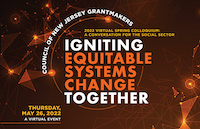
Date: Thursday, May 26
Time: 1:00 to 5:00 p.m.
On May 26, the Council brought together recognized thought leaders from philanthropy and nonprofits for a conversation exploring how the social sector can advance systems change.
Grantmakers and nonprofits grapple with complex, structural issues every day, and take on the difficult questions to move our collective work forward.
During a dynamic discussion, panelists shared strategies to empower proximate leaders, remove structural barriers and build the capacity of grassroots organizations, and shift mental models to challenge assumptions and strengthen nonprofit-funder relationships. After the panel, case study presenters highlighted three local examples of systems change, emphasizing the importance of cross-sector collaboration, collective action, and community engagement. Then, attendees gathered together for small group discussions to unpack key takeaways and discuss their own successes and challenges with systems change.
One of the most highly regarded convenings for social sector leaders in the state, the 2022 Virtual Spring Colloquium considered the power and cultural shifts needed to advance systems change through philanthropic and nonprofit partnership.
Attendees can revisit Whova to access event features such as session recordings, exhibitor virtual booths and sponsor pages, NJ Poetry Out Loud performances, and more.
| Agenda | |
| 1:00 - 1:30 pm: | Opening Session Featuring Sponsors & Exhibitors |
| 1:30 - 2:00 pm: | Break & Independently Visit with Sponsors & Exhibitor Virtual Booths |
| 2:00 - 3:30 pm: | Panel Discussion & Case Study Presentations - Igniting Equitable Systems Change Together |
| 3:30 - 4:00 pm: | Small Group Discussions |
| 4:00 - 4:15 pm: | Break & Independently Visit with Sponsors & Exhibitor Virtual Booths |
| 4:15 - 5:00 pm: | Networking Reception Featuring NJ Trivia |
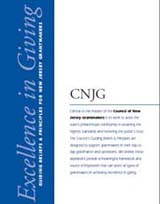
This includes insights and tips related to board governance, legal compliance, grantee communications, fiscal responsibility, public disclosure, and many other key areas of foundation governance and operations. It is intended to serve as a practical resource to assist foundations in their grantmaking.
One year from now the 2020 Census will be in full swing. This nationwide, constitutionally-mandated count, conducted once every ten years, is our opportunity to ensure that New Jersey residents are accurately counted to secure the resources needed to support our communities. Nationally, more than $800 billion in federal funding as well as fair, proportional voting representation are at stake. In New Jersey, allocations from 16 federal programs including Medicaid, education grants, and even highway planning and construction are allotted based on the census count. This totaled over $17 billion in 2015.
But the 2020 Census is facing unprecedented challenges, including years of underfunding, a climate of fear, the challenges of the first “high tech” census, and the potential addition of an untested citizenship question. That means we will all have to work together to overcome these challenges and help achieve a fair and accurate census to ensure that the hardest-to-count communities—like people of color, low-income folks, LGBTQ people, immigrant communities, rural communities, and young children—aren’t missed. Based on the latest census estimates, approximately 22% of New Jersey’s population lives in hard-to-count areas.
CNJG joins the Funders’ Committee for Civic Participation’s Funders Census Initiative, United Philanthropy Forum and philanthropy-serving organizations around the country in asking our members to commit to supporting and encouraging a fair and accurate census.
The Census is one of our nation’s most important and consequential civic obligations. Getting it right and counting everyone ensures people and communities can thrive.
Please feel free to reach out to me or Deputy Director Theresa Jacks for information about the Council’s work on behalf of a full, fair and accurate 2020 Census.
Sincerely,
Maria Vizcarrondo, President and CEO
Council of New Jersey Grantmakers
Directors & Officers liability insurance provides financial protection for a foundation and its directors, officers, employees, and volunteers in the event of a lawsuit. CNJG offers its members the D&O liability insurance program provided through Aon Association Services, underwritten by The Hartford and endorsed by the United Philanthropy Forum. A discount is available to foundations with current membership with CNJG.
Fiduciary Liability and other coverage is also available to members at a discounted rate. Coverage is available in all states. Brokers can access the Forum’s D&O program through Aon Association Services.
Learn more using the documents below, on the Aon website or by contacting Jason Tharpe, program administrator at Aon Affinity, at 202-429-8561. To obtain the discount, foundations should let Aon know they are a member of CNJG, a member of the United Philanthropy Forum.
These news articles show our members’ responses to the coronavirus pandemic, including announcements, emails, blogs, grants and other resources. If you have items to add, please email us.
Actions and Announcements
Audible Creates Global Center for Urban Development and Hires Aisha Glover to Help Lead It
Russell Berrie Foundation Post: Our Response to COVID-19
Campbell Soup to pay hourly employees premium during outbreak
Post: Our Response to COVID-19
Geraldine R. Dodge Foundation
Dodge signs CoF pledge
Grunin Foundation 3/13 COVID-19 Announcement and 3/31 COVID-19 Update
Johnson & Johnson’s lead COVID-19 vaccine candidate shots for early 2021 authorization
Robert Wood Johnson Foundation
Culture of Health Blog: Handwashing to Slow the Coronavirus Pandemic
Opinion: Racism is the other virus sweeping America during this pandemic by Julie Morita, M.D
Opinion: Disabled Americans can’t be a COVID-19 afterthought by Dr. Richard Besser
Culture of Health Blog: Incarceration Rates: A Key Measure of Health in America
Opinion: In Covid-19 Crisis, Philanthropy’s Attention Must Focus on People With Disabilities
Brief: Health Equity Principles for State and Local Leaders in Responding, Reopening & Recovering from COVID-19
Culture of Health Blog: Lessons for an Equitable COVID-19 Response and Recovery
Kessler Foundation has produced two COVID related podcasts:
Practical Tips to Help Survive the Pandemic as a Parent of a Child with Autism
COVID-19 and Spinal Cord Injury: Minimizing Risks for Complications
New Jersey Council of Humanities Op-ed: Staying Human During the Pandemic
New Jersey Health Initiatives’ Deputy Director of Programs, and CNJG Board Member Diane Hagerman penned “Collaboration across county lines is key to a healthy New Jersey” on NJ Spotlight.
New Jersey Council for the Humanities and New Jersey Historical Commission present a webinar series for cultural nonprofits navigating the COVID-19 pandemic
New Jersey Economic Development Authority assists more than 10,000 small businesses impacted by COVID-19
New Jersey State Council on the Arts partners with ArtPride New Jersey Foundation on “Keep Jersey Arts Alive” campaign.
Newark Arts and the City of Newark Retools Its Ambitious Arts Grant Program to Respond to COVID-19
Nicholson Foundation Email to Grantees
Nicholson honors their own Colette Lamothe-Galette, lost to COVID-19
OceanFirst Foundation and Grunin Foundation along with Townsquare Media Launch Acts of Kindness Campaign
Subaru teams up with TerraCycle on PPE recycling
Turrell Fund Email to Grantees about CARES Act
Turrell Fund manages new Passaic County Pandemic Partnership hosted at the Community Foundation of New Jersey
United Way of Greater Mercer County Op-ed message from Sandra Toussaint
Valley National Bank offers Community Pledge CD to help donate and save at the same time
Resources
Newark Trust for Education COVID19 Resources
New Jersey State Council on the Arts Resources for Artists and Arts Organizations
Video: Hear from recognizable native New Jersey voices about the importance of donating to the New Jersey Pandemic Relief Fund
PKF O’Connor Davies: Grantmaking During Disasters & Tax-favored Financial Assistance to Employees
In 2003, with member support, CNJG commissioned a report on the impact a potential conversion of Horizon Blue Cross Blue Shield to a for-profit might have on access to health care in New Jersey. Research from the Center for State Health Policy (CSHP) at Rutgers University, provided details about the law governing such conversions in New Jersey and the experience of other states with conversions. The report identified questions raised in other states when such conversions occur, especially about the valuation of assets, the impact on low-income families, and the operation of the philanthropic foundations that have been established as stewards of the assets generated by the conversions. CNJG’s purpose was to seek answers to critical questions relevant to the availability of healthcare coverage for New Jersey’s citizens and to discuss models of best practice for healthcare conversion foundations across the United States.
Excellence in Giving
In 2005, CNJG adopted Guiding Beliefs & Principles to offer a thoughtful source of direction and inspiration to help guide our state’s philanthropic sector into the future. CNJG first launched its Excellence in Giving initiative in 2007 with the goal is to provide grantmakers the practical tools necessary to ensure best practice in their operations and grantmaking.
The first booklet, Guiding Beliefs & Principles for New Jersey Grantmakers includes a wealth of insights and tips related to board governance, legal compliance, grantee communications, fiscal responsibility, public disclosure, and many other key areas of foundation governance and operations. It contains wisdom provided by leaders of all types of giving organizations within the CNJG’s membership, and is intended to serve as a practical resource to assist New Jersey foundations in their grantmaking. CNJG’s board is in the process of updating these beliefs and principles in 2023/2024. For more information on the updating process, please contact Theresa Jacks.
 In 2010 CNJG released a second, comprehensive resource to help the state’s philanthropic community understand their ethical, legal, and fiduciary requirements and obligations - What Every Grantmaker Should Know and Frequently Asked Legal Questions. These two booklets are key publications in CNJG’s Excellence In Giving Series. While the Guiding Beliefs & Principles is available publically, members will need to log into access the legal guide for download.
In 2010 CNJG released a second, comprehensive resource to help the state’s philanthropic community understand their ethical, legal, and fiduciary requirements and obligations - What Every Grantmaker Should Know and Frequently Asked Legal Questions. These two booklets are key publications in CNJG’s Excellence In Giving Series. While the Guiding Beliefs & Principles is available publically, members will need to log into access the legal guide for download.
Members can request additional copies of the booklets mentioned on this page by contacting Theresa Jacks.
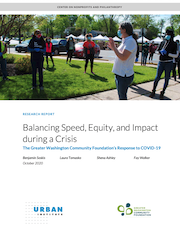
The COVID-19 public health and economic crisis has changed our world as we know it. As employers moved to remote work, schools shifted to distance learning, and businesses closed completely, it became clear that the impact on residents, nonprofits, and businesses was far greater than anyone could have ever imagined.
In response to the growing and evolving needs of our region, the Greater Washington Community Foundation established the COVID-19 Emergency Response Fund to raise and rapidly deploy funding to local nonprofits providing food, shelter, educational supports, and other critical services.
From the beginning our goal was clear: to address the immediate needs and reach adversely affected communities, particularly low-income households and communities of color. We know all too well that in a crisis like this, these marginalized communities are hit the hardest, and often take the longest to recover.
In times of crises, The Community Foundation is our region’s philanthropic first responder, bringing together individuals and families, philanthropic peers, corporate partners, and local government advisors to address community issues. Building on our rich history of emergency response work, we grounded our COVID-19 response efforts in a similar coordinated approach.
This report chronicles the steps taken, under immense pressure, to develop a coordinated emergency response effort to support a broad range of needs across the region. Once again this effort has demonstrated that working in partnership and close collaboration with our philanthropic peers and local government advisors is an effective way to manage a response to both urgent and longer-term needs.
This publication from Grantmakers for Effective Organizations offers a framework for thinking about how to measure progress and results in place-based and community change initiatives.
Community foundations are beginning to deepen and shift how they work, adopting an anchor mission that seeks to fully deploy all resources to build community wealth. Moving into territory relatively uncharted for community foundations, they are taking up impact investing and economic development — some in advanced ways, others with small steps. This report offers an overview of how 30 representative community foundations — including The Seattle Foundation, the Vermont Community Foundation, and the Greater Cincinnati Foundation — are working toward adopting this new anchor mission.
This Democracy Collaborative report was written by Marjorie Kelly, Senior Fellow and Director of Special Projects and Violeta Duncan, Community Development Associate.
A CNJG member queried the Health & Aging listserves asking for sample letters of inquiry. This document includes a few responses from fellow members. If you would like to add yours to this list, please email us.

Get on the map and give smarter
Get on the Map is an exciting data-sharing initiative designed to dramatically improve the quality and availability of giving data for our region. Using this tool to put your grantmaking in context will provide valuable insights that can transform your giving.
Knowing how other foundations or corporations are funding in a certain geographic area or with a specific nonprofit can make everyone’s work more effective.
 Imagine real-time answers to questions like:
Imagine real-time answers to questions like:
- How are others serving at-risk youth?
- Are organizations in our region receiving enough capacity building support?
- Who else funds economic development in our rural communities?
Through a partnership with Candid (formerly the Foundation Center) and the United Philanthropy Forum, Get on the Map enables CNJG members to see the scope of their grantmaking, find natural funding partners, and gain deeper understanding of New Jersey’s philanthropic landscape.
Watch the short video below to learn how easy it is to Get on the Map!
It starts with sharing your giving data
Your data will power valuable resources for your organization and our region, including access to the CNJG Foundation Funding Map, a special interactive searchable mapping platform, engineered by Candid.
When you share your data, you control your story. No one knows your grantmaking better than you. Tell your story, your way is good for the sector because better information benefits everyone. Join the community of funders sharing their data to ensure the field is acting on the best possible information. Share Now!
Self-Paced Training for Funders on Using Candid
Candid has also launched a new, free self-paced course for funders: Funding Smarter: Using Candid Tools to Inform and Share Your Foundation’s Work. The course is meant to help funders use Candid’s mapping, data, and knowledge tools to better identify funding peers, potential grantee partners, identify funding connections and gaps, and learn from knowledge other funders have already shared. It also highlights the value of sharing data with Candid.

